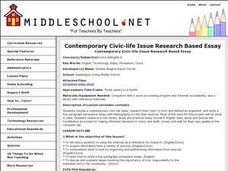Curated OER
An Anecdote is Worth a Thousand Pictures
Students identify anecdotes in speeches and the purposes that politicians use the anecdotes for. They create personal anecdotes for the class to hear, and students decide if the anecdote is real or fabricated.
Curated OER
Robinson vs Barlow and the White Indians: A Trial
Young scholars judge the actions of Nathan Barlow and the White Indians by putting them on trial in the classroom. They discuss how public opinion can change based on time. Students judge the White Indians based on the early 1800's not...
Curated OER
Dealing with DNA Controversy
Pupils research controversial statements about biological applications and write a persuasive essay. In this biology lesson plan, students are assigned a controversial statement as a research topic, then they use this topic to create a...
Curated OER
Finding and Gathering The News
Eighth graders discover what makes an event newsworthy. They research topics by using the five W questions. They examine the difference between facts and opinions and practice interviewing people for stories.
Curated OER
Students as Historians: Investigating the Gulf War
Sixth graders investigate the Gulf War using primary and secondary sources. Students research using a variety of sources including the internet.
Curated OER
Source Search: Agricultural Products
Farmers just farm, right? Find out how important agricultural products are to our modern society. Learners will explore the foods, textiles, and fuels made from industrial farm goods. They'll also explore the idea of choosing an...
Curated OER
Navajo Code Talkers
An engaging lesson focuses on the contributions of the Navajo people during World War II. Learners read the book Navajo Code Talkers by Andrew Santella, answer a series of comprehension questions about the text, and write a letter as a...
Curated OER
Contemporary Civic-life Issue Research Based Essay
Seventh graders write a five paragraph persuasive essay on a contemporary civic-life issue.
Curated OER
Why Do I Want All This Stuff?
Students identify two factors that determine consumer demand as well as substitutes and complements for selected goods and services. After examining advertisements, they distinguish between fact and opinion and explore the factors that...
Curated OER
The Atomic Bomb Dilemma
Students examine consequences of using atomic bomb in light of resulting peace, distinguish between fact and opinion and analyze sources to recognize bias and points of view, and assume role of reporter, critic, cabinet member, or...
Curated OER
Up, Up, and Away
Middle schoolers research hot-ballooning using Internet resources including an around-the-world balloon flight. They determine fact from opinion, examine point of view, and determine main idea, and details. They write a journal entry...
Curated OER
LESSON PLAN: CONTROLLING NUCLEAR WEAPONS: DEBATING THE NON-PROLIFERATION TREATY
Ninth graders examine various nuclear weapons. In this American Government instructional activity, 9th graders conduct primary source research to investigate nuclear weapons and the international nuclear Nonproliferation Treaty. Students...
State Bar of Texas
Tinker v. Des Moines
Freedom of speech allows anyone, even those in school, to say and do what they feel—right? The 1969 Supreme Court case Tinker v. Des Moines serves as the backdrop for a study on First Amendment rights. Scholars use a short video along...
State Bar of Texas
Roe v. Wade
At what point does the right of privacy end and the government begin? Scholars research rights under the Ninth Amendment to the Constitution. Using the 1973 Roe v. Wade Supreme Court case as a starting point, along with small group work...
Curated OER
Shaking the Movers: Youth Rights and Media
Children have rights! Exploring those rights and using media to express those rights is the focus of this Media Awareness Network lesson. Although some of the law links reflect the Canadian Articles of The Convention, the majority of the...
Social Media Toolbox
Ethical Decision Making
When faced with a dilemma, how do journalists decide how much news to use? Social media scholars explore the philosophies of ethical resolution in the first of a 16-part Social Media Toolbox series. Partnered pupils use a Potter Box to...
State Bar of Texas
Grutter v. Bollinger
A university decides not to allow a qualified scholar to enter its institution based on skin and gender—but this case is about a white female? The 2003 Supreme Court case Grutter v. Bollinger lays the foundation for open discussion and...
Curated OER
The Quilting Connection....a Teaching Unit on Slavery, the Underground Railroad And Quilting
Students research the Internet, read designated books and selection, participate in discussions and write short reports while completing this series of lessons about slavery and the Underground Railroad. As a final project, they design a...
Missouri Department of Elementary
How We Are Alike And Different
Scholars develop social awareness by exploring the concept of similarities and differences. Learners examine two beverages and use a Venn diagram to identify similarities and differences. They tally each item to identify if they are more...
Curated OER
Columbus: Hero or Villain?
Students explore Christopher Columbus's motives. In this character education lesson plan, students research Internet and print sources regarding the life and actions of Christopher Columbus in order to write essays that his actions as...
Curated OER
Why A Bill of Rights?
Examine conflicting viewpoints in this lesson, in which middle schoolers write their own proposal for including a Bill of Rights in the Constitution. As a class, they discover how the Bill of Rights was not a planned document to be...
Curated OER
Evolving Views about Minority Rights in the United States
Tenth graders compare and contrast majority and minority outlooks on issues. In this social justice lesson, 10th graders research majority and minority values regarding the Salem Witch Trials, Plessy v. Ferguson, the McCarthy hearings,...
Curated OER
Wolves
Students explore wolves. In this ecology and wolves lesson, students research predator-prey relationships on the Internet and complete a related worksheet with a partner. Students interpret data on bar graphs to determine growth and...
Curated OER
Observation
Students study the different kinds of observation: fact and opinion. For this observation lesson students complete an activity that allows them to use their senses to make observations.

























